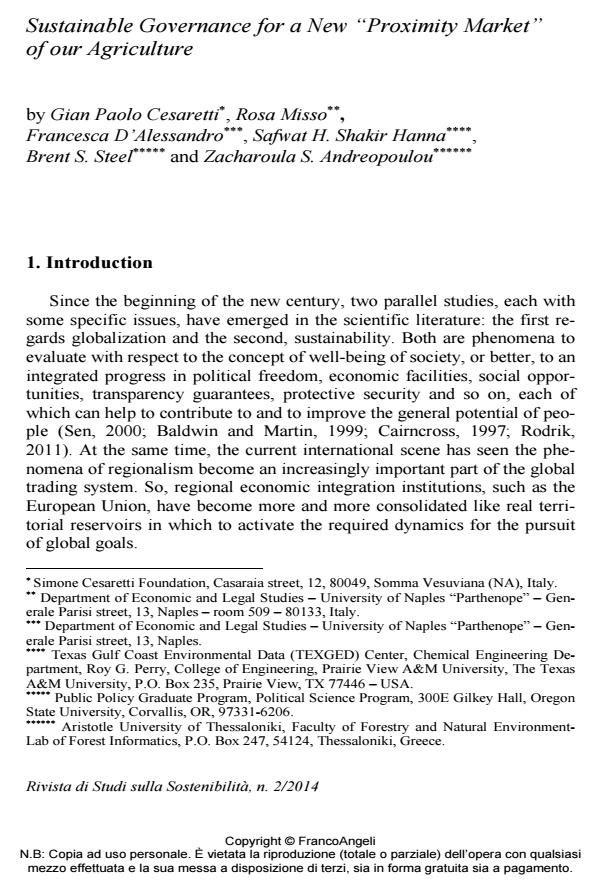Sustainable Governance for a New "Proximity Market"of our Agriculture
Journal title RIVISTA DI STUDI SULLA SOSTENIBILITA'
Author/s Gian Paolo Cesaretti, Rosa Misso, Francesca D'Alessandro, H. Shakir Hanna Safwat, Brent S. Steel, Zacharoula S. Andreopoulou
Publishing Year 2014 Issue 2014/2
Language English Pages 12 P. 31-42 File size 159 KB
DOI 10.3280/RISS2014-002003
DOI is like a bar code for intellectual property: to have more infomation
click here
Below, you can see the article first page
If you want to buy this article in PDF format, you can do it, following the instructions to buy download credits

FrancoAngeli is member of Publishers International Linking Association, Inc (PILA), a not-for-profit association which run the CrossRef service enabling links to and from online scholarly content.
The review of institutional organization of the municipalities in metropolitan cities leads us to reflect on the new role that agriculture and its stakeholders have to play in the pursuit of sustainability of well-being. In this context, this paper aims to highlight new models of governance for agriculture in the future, more appropriate to the emergence of a new proximity market, but especially more embedded in a feedback system that it will be able to offer in terms of lifestyles, mobility, work, health, leisure, social relationships and milieu. More precisely, agriculture can find a proximity market, whether it will be able to ensure the replicability of the stock of social, human, natural and economic capital, to respond to new lifestyles and to maintain and protect the identity of the territory.
Keywords: Proximity market, sustainability of well-being, sustainable agriculture, metropolitan city, proximity agriculture
- Towards a Universal Right to Well-being Sustainability Gian Paolo Cesaretti, Maria Carmen de Angelis, Rosa Misso, Aquilina Olleia, Hanna Safwat H. Shakir, in RIVISTA DI STUDI SULLA SOSTENIBILITA' 1/2015 pp.9
DOI: 10.3280/RISS2015-001002 - Regional Sustainability Christiana Koliouska, Zacharoula Andreopoulou, Rosa Misso, Irene Paola Borelli, in International Journal of Agricultural and Environmental Information Systems /2017 pp.29
DOI: 10.4018/IJAEIS.2017010103
Gian Paolo Cesaretti, Rosa Misso, Francesca D'Alessandro, H. Shakir Hanna Safwat, Brent S. Steel, Zacharoula S. Andreopoulou, Sustainable Governance for a New "Proximity Market"of our Agriculture in "RIVISTA DI STUDI SULLA SOSTENIBILITA'" 2/2014, pp 31-42, DOI: 10.3280/RISS2014-002003